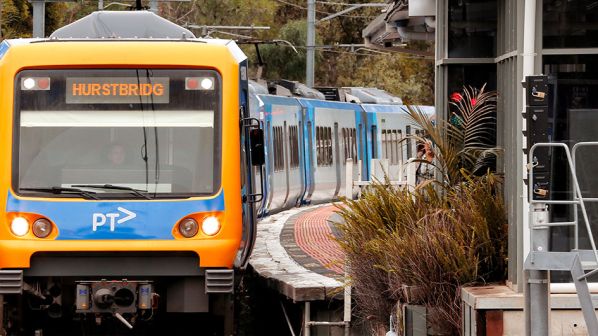ABB has announced the results of a pilot project to install a 1.5kV dc Enviline Energy Storage System (ESS) system, which stores energy gathered as trains brake as they enter a station, before feeding it back into the grid as the train accelerates out of the station. The pilot was undertaken as part of the Metro Trains Melbourne (Metro) Hurstbridge Line Upgrade Project.
ABB says the energy redistributor was installed as an alternative to building and connecting a new rectifier substation on the line.
The three-year project, which was completed six months ago, was led by the product marketing manager of ac and dc traction power, Mr Stephen Poh, and lead project engineer, Mr Steven Dineen, together with the ABB factory team in Bielsko-Biala, Poland.
Metro tendered the project after experiencing frequent voltage drops around Diamond Creek, between Wattle Glen and Eltham on the Hurstbridge Line. The operator was also looking to increase the frequency of services on the line.
“Imagine electricity supply is like a piece of string,” Poh says. “The longer the distance between substations, the looser that string gets until there’s a real dip in between. The traditional solution is to put in another rectifier substation, to improve that supply dip. Metro identified a business case to work with us on an energy-management solution.”
The energy-management system was found to be more cost effective in terms of land use and construction. It also resulted in a 15% reduction in carbon emissions and supplemented electricity drawn from the grid.
ABB had previously developed an ESS solution for 750V dc lines in the United States and Europe. ABB’s ESS experts based in the Polish Technology Centre worked with the engineering team in Australia for a year to develop and test a 1.5kV dc ESS using supercapacitor storage with 44MJ capacity, which met Metro's requirements and applicable standards.
To ensure a higher level of safety for maintenance employees, Metro requested automatic earthing switches be incorporated into the design of the ESS, which ABB says was achieved through redesigning the system. “We created a 20-page specification just for the innovative automatic earthing piece,” Poh says.
The installation and on-site testing were impacted by the Covid-19 pandemic, with ABB initiating a virtual commissioning process to allow all parties, including Metro and overseas colleagues, to work remotely.
“The process of organising a midnight-to-dawn tuning run with rolling stock, train drivers, controllers and so on had begun, when countries started shutting their borders in response to the Covid-19 pandemic,” Dineen says. “Our Polish team had young families and couldn’t be stuck in Australia indefinitely, so they rushed back home, and we began working out how we could commission the system with them remotely supporting the necessary procedures.”
The system was commissioned in the first half of 2021, and the ESS was connected to the Hurstbridge Line’s network late last year. “Not a moment of the three years plus of assessment and engineering has been in vain,” Poh says. “Both the original Enviline 1.5kV global-standard ESS and the unique ultra-safety-enhanced system are now fully tested to meet Metro requirements.”

